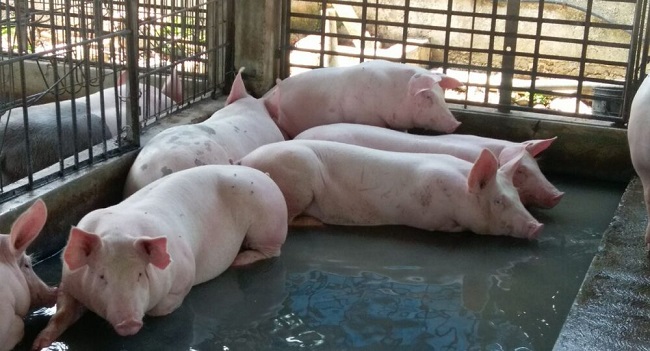Groundwater flowing through Kinchil and Maxcanú is unfit for human consumption, contaminated with fecal coliforms from the Kekén pig farms installed in the region, revealed a study carried out by the Jaltún.mx platform, with technical assistance from the United Nations Development Program (UNDP).
The study included the analysis of 200 samples taken from 23 bodies of water, mostly cenotes and artesian wells, over a period of eight months in 2022. Unfortunately, the result was that 100 percent of the samples tested positive for fecal coliforms, demonstrating the serious damage caused by the mega-farms.
All of the liquid that was analyzed showed contamination with bacteria such as Escherichia coli, a group of bacteria that naturally inhabit the human intestine and some animals without causing disease, but there are some types that are harmful to humans, entering the body by consuming contaminated food or water, causing gastroenteritis with intense diarrhea, mucus or bleeding.
“The presence and volume of coliforms in most of the samples obtained indicate fecal contamination in cenotes, water eyes and wells in the study area. These results are consistent with the epidemiological bulletins of the National Epidemiological Surveillance System for Yucatán, which show an increase in cases of intestinal infectious diseases,” said Elena, one of the members of the Chik’in-já Maya Council, during the activity in Kinchil.

According to spokespersons for the Maya Chik’in-já Council and the community care collective U Yutzil Kaaj, 35 percent of the samples showed the most severe contamination, according to the parameters determined by the World Health Organization (WHO).
Recently, the environmental lawyer Lourdes Medina Carrillo affirmed that in Yucatán there are a total of 507 pig farms registered by the Ministry of the Environment and Natural Resources (Semarnat), 353 of which are in the Cenotes Ring, 69.62 percent.
Of the large total, 13 of them have an Environmental Impact Statement (MIA) authorization, or 2.56 percent, which indicates that this agricultural activity is not sustainable and is not regulated, much less supervised.
In addition to its large size and the support of the authorities, the intensive pork production model in Yucatán has another particular feature: it operates under the form of a monopoly controlled by Kekén, a company owned by Grupo KUO with annual revenues of around 28.7 billion pesos.
TYT Newsroom



